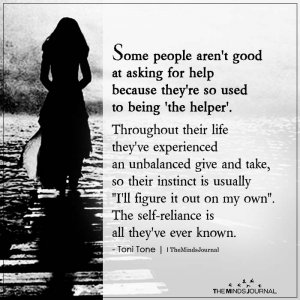grahamg
Old codger
- Location
- South of Manchester, UK
How often do we all hear the refrain, "So and so needs help, but they need to ask for it first"?
I know there is much truth in the statement, BUT, it isn't the whole story is it(?).
For example how many of us can say "we've never received unexpected help in our lives", (and we've been very glad of it and grateful to have received such help)?
Then there is the issue of why it is so very difficult for so many people to accept assistance, when they very much need it, (we're all guilty of this sometimes perhaps, certainly I've very much been in that situation).
What to do then, for those who probably need a miracle to save them, and I would consider it a near miracle if they were ever able to accept the help they most desperately need, before their lives are completely thrown away, (the person I'm thinking of could not be much worse, and in all likelihood is near the end of his life)?
Help, and those willing and capable of giving what is required, cannot always force the assistance needed on whoever it might be, and in truth, especially as so often whatever help is offered isn't appreciated by those you're trying to assist, you maybe dont offer as much support as you would otherwise do, (though I may be coming up with an excuse myself there).
There we go, I do believe we're dealing with a conundrum, and yet I dont see so many people repeating the mantra, "so and so needs to ask for help before they can be helped", moves anyone further forward. Maybe saying it or thinking it, means those unable to accept help have that negative behaviour reinforced even, because they maybe already know they're causing their own demise, and whatever it is inside us/them that makes it hard to accept help, such as admitting to ourselves we're weak for example, is something we wish to hide too.
Here is an article related to the thread topic you might find useful:
https://www.huffpost.com/entry/trouble-accepting-help_b_951545
I know there is much truth in the statement, BUT, it isn't the whole story is it(?).
For example how many of us can say "we've never received unexpected help in our lives", (and we've been very glad of it and grateful to have received such help)?
Then there is the issue of why it is so very difficult for so many people to accept assistance, when they very much need it, (we're all guilty of this sometimes perhaps, certainly I've very much been in that situation).
What to do then, for those who probably need a miracle to save them, and I would consider it a near miracle if they were ever able to accept the help they most desperately need, before their lives are completely thrown away, (the person I'm thinking of could not be much worse, and in all likelihood is near the end of his life)?
Help, and those willing and capable of giving what is required, cannot always force the assistance needed on whoever it might be, and in truth, especially as so often whatever help is offered isn't appreciated by those you're trying to assist, you maybe dont offer as much support as you would otherwise do, (though I may be coming up with an excuse myself there).
There we go, I do believe we're dealing with a conundrum, and yet I dont see so many people repeating the mantra, "so and so needs to ask for help before they can be helped", moves anyone further forward. Maybe saying it or thinking it, means those unable to accept help have that negative behaviour reinforced even, because they maybe already know they're causing their own demise, and whatever it is inside us/them that makes it hard to accept help, such as admitting to ourselves we're weak for example, is something we wish to hide too.
Here is an article related to the thread topic you might find useful:
https://www.huffpost.com/entry/trouble-accepting-help_b_951545
Last edited:


